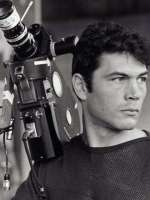Luiz Floriano Bonfá est un Acteur et Son Brésilien né le 17 octobre 1922 à Rio de Janeiro (Bresil)

Luiz Floriano Bonfá (often seen as Luis Bonfá) (October 17, 1922 – January 12, 2001) was a Brazilian guitarist and composer. He was best known for the compositions he penned for the film Black Orpheus.
Bonfá first gained widespread exposure in Brazil in 1947 when he was featured on Rio's Rádio Nacional, then an important showcase for up-and-coming talent. He was a member of the vocal group Quitandinha Serenaders in the late 1940s. Some of his compositions were recorded and performed by Brazilian crooner Dick Farney in the 1950s. It was through Farney that Bonfá was introduced to Antonio Carlos Jobim and Vinicius de Moraes, the leading songwriting team behind the worldwide explosion of Brazilian jazz/pop music in the late 1950s and 1960s. Bonfá collaborated with these and with other prominent Brazilian musicians and artists in productions of de Moraes' anthological play Orfeu da Conceição, which several years later gave origin to Marcel Camus' legendary film "Black Orpheus" (Orfeu Negro in Portuguese). In the burgeoning days of Rio de Janeiro's thriving jazz scene, it was commonplace for musicians, artists, and dramatists to collaborate in such theatrical presentations. Bonfá wrote some of the original music featured in the film, including the numbers "Samba de Orfeu" and his most famous composition, "Manhã de Carnaval" (of which Carl Sigman later wrote a different set of English lyrics titled "A Day in the Life of a Fool"), which has been among the top ten standards played worldwide, according to The Guinness Book of World Records.
As a composer and performer, Bonfá was at heart an exponent of the bold, lyrical, lushly orchestrated, and emotionally charged samba-canção style that predated the arrival of João Gilberto's more refined and subdued bossa nova style. Jobim, João Donato, Dorival Caymmi, and other contemporaries were also essentially samba-canção musicians until the sudden, massive popularity of the young Gilberto's unique style of guitar playing and expressively muted vocals transformed the music of the day into the music of the future. Camus' film and Gilberto's and Jobim's collaborations with American jazzmen such as Stan Getz and Charlie Byrd did much to bring Brazilian popular music to the attention of the world, and Bonfá became a highly visible ambassador of Brazilian music in the United States beginning with the famous November 1962 Bossa Nova concert at New York's Carnegie Hall.
Luiz Bonfá worked with American musicians such as Quincy Jones, George Benson, Stan Getz, and Frank Sinatra, recording several albums while in United States. Elvis Presley sang a Bonfá composition, "Almost in Love", in the 1968 MGM film "Live a Little, Love a Little".
Bonfá died in Rio de Janeiro on January 12, 2001. He was 78 years old.
Source : Wikidata
Luiz Floriano Bonfá

- Infos
- Photos
- Meilleurs films
- Famille
- Personnages
- Récompenses
Nationalité Bresil
Naissance 17 octobre 1922 à Rio de Janeiro (Bresil)
Mort 12 janvier 2001 (à 78 ans) à Rio de Janeiro (Bresil)
Naissance 17 octobre 1922 à Rio de Janeiro (Bresil)
Mort 12 janvier 2001 (à 78 ans) à Rio de Janeiro (Bresil)
Biographie
Bonfá was born on October 17, 1922, in Rio de Janeiro. He began teaching himself to play guitar as a child; he studied in Rio with Uruguayan classical guitarist Isaías Sávio from the age of twelve. These weekly lessons entailed a long, harsh commute by rail and on foot from his family home in the western rural outskirts of Rio de Janeiro to the teacher's home in the hills of Santa Teresa. Given Bonfá's extraordinary dedication and talent for the guitar, Sávio excused the youngster's inability to pay for his lessons.Bonfá first gained widespread exposure in Brazil in 1947 when he was featured on Rio's Rádio Nacional, then an important showcase for up-and-coming talent. He was a member of the vocal group Quitandinha Serenaders in the late 1940s. Some of his compositions were recorded and performed by Brazilian crooner Dick Farney in the 1950s. It was through Farney that Bonfá was introduced to Antonio Carlos Jobim and Vinicius de Moraes, the leading songwriting team behind the worldwide explosion of Brazilian jazz/pop music in the late 1950s and 1960s. Bonfá collaborated with these and with other prominent Brazilian musicians and artists in productions of de Moraes' anthological play Orfeu da Conceição, which several years later gave origin to Marcel Camus' legendary film "Black Orpheus" (Orfeu Negro in Portuguese). In the burgeoning days of Rio de Janeiro's thriving jazz scene, it was commonplace for musicians, artists, and dramatists to collaborate in such theatrical presentations. Bonfá wrote some of the original music featured in the film, including the numbers "Samba de Orfeu" and his most famous composition, "Manhã de Carnaval" (of which Carl Sigman later wrote a different set of English lyrics titled "A Day in the Life of a Fool"), which has been among the top ten standards played worldwide, according to The Guinness Book of World Records.
As a composer and performer, Bonfá was at heart an exponent of the bold, lyrical, lushly orchestrated, and emotionally charged samba-canção style that predated the arrival of João Gilberto's more refined and subdued bossa nova style. Jobim, João Donato, Dorival Caymmi, and other contemporaries were also essentially samba-canção musicians until the sudden, massive popularity of the young Gilberto's unique style of guitar playing and expressively muted vocals transformed the music of the day into the music of the future. Camus' film and Gilberto's and Jobim's collaborations with American jazzmen such as Stan Getz and Charlie Byrd did much to bring Brazilian popular music to the attention of the world, and Bonfá became a highly visible ambassador of Brazilian music in the United States beginning with the famous November 1962 Bossa Nova concert at New York's Carnegie Hall.
Luiz Bonfá worked with American musicians such as Quincy Jones, George Benson, Stan Getz, and Frank Sinatra, recording several albums while in United States. Elvis Presley sang a Bonfá composition, "Almost in Love", in the 1968 MGM film "Live a Little, Love a Little".
Bonfá died in Rio de Janeiro on January 12, 2001. He was 78 years old.
Ses meilleurs films
Le plus souvent avec
Filmographie de Luiz Floriano Bonfá (6 films)
Acteur

Copacabana Palace (1962)
, 2h7Réalisé par Steno
Origine Italie
Genres Drame, Comédie, Aventure, Musical, Policier
Thèmes La musique, Musique
Acteurs Sylva Koscina, Walter Chiari, Mylène Demongeot, Claude Rich, Paolo Ferrari, Luiz Floriano Bonfá
Rôle lui-même
Note51%





À Rio de Janeiro, au Copacabana Palace, durant trois jours, chassés-croisés amoureux s'emmêlent avec petites combines sur fond de festivités du célèbre carnaval. Trois (sympathiques) complices se voient devancés sur un coup dans la salle des coffres de l'hôtel ; trois charmantes hôtesses de l'air cherchent à se divertir, mais leurs trois hôtes cariocas, les musiciens Tom Jobim, Luiz Bonfá et João Gilberto sont mariés ; un homme (Claude Rich), séparé de sa femme, veut surprendre celle-ci en flagrant délit d'adultère.
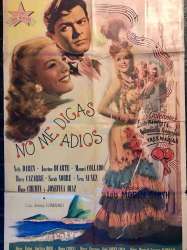
No Me Digas Adiós (1950)
Genres Aventure, Musical, Romance
Thèmes Musique
Acteurs Lourdinha Bittencourt, Luiz Floriano Bonfá, Pablo Cumo, Anselmo Duarte
Son
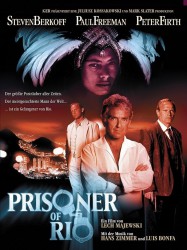
Prisoner of Rio (1988)
, 1h44Réalisé par Lech Majewski
Origine Royaume-uni
Genres Drame, Thriller
Acteurs Steven Berkoff, Paul Freeman, Peter Firth, Florinda Bolkan, Desmond Llewelyn, José Wilker
Note56%





After escaping from Wandsworth prison for his part in the Great Train Robbery, Ronald "Ronnie" Biggs (Paul Freeman) goes on the run to Rio de Janeiro and becomes the world's most wanted man. Hot on his trail however is committed copper Jack McFarland (Steven Berkoff), who will stop at nothing to bring him back to justice - even if that means stepping outside the law.
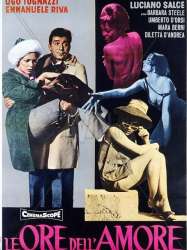
Les Heures de l'amour (1963)
, 1h50Origine Italie
Genres Comédie, Comédie romantique, Romance
Acteurs Ugo Tognazzi, Emmanuelle Riva, Barbara Steele, Umberto D'Orsi, Mara Berni, Brunello Rondi
Note62%





Gianni et Maretta vivent une relation amoureuse intense depuis trois ans et décident de se marier. Le mariage change radicalement leur vie et leurs rapports se dégradent. La vie commune et la routine quotidienne mettent en berne leur passion et limitent la liberté respective car leurs centres d'intérêt sont différents et difficilement conciliables. Le couple se perd dans des tentatives maladroites de tromperie pour finalement se rendre compte que leur amour reste intact, bien que mis à mal par la vie commune. Ainsi, afin de sauver leur rapport, ils décident de retourner à leur statut de fiancés, fait de rencontres amoureuses en restant chacun chez soi.
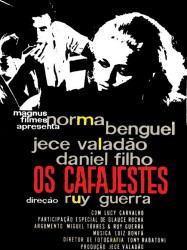
La Plage du désir (1962)
, 1h40Réalisé par Ruy Guerra
Origine Bresil
Genres Drame, Policier
Acteurs Daniel Filho, Norma Bengell, Hugo Carvana, Glauce Rocha
Note69%





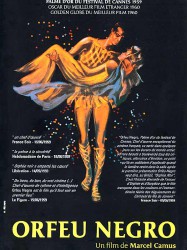
Orfeu Negro (1959)
, 1h45Réalisé par Marcel Camus
Origine Bresil
Genres Drame, Science-fiction, Comédie, Comédie dramatique, Fantasy, Musical, Romance
Thèmes Carnaval, La musique, Mythologie, Théâtre, Musique, Mythologie grecque, Adaptation d'une pièce de théâtre, Mythologie gréco-romaine
Acteurs Breno Mello, Marpessa Dawn, Léa Garcia, Marcel Camus
Note73%





Ce film revisite le mythe d'Orphée et d'Eurydice en le transposant de Thrace à Rio de Janeiro pendant le carnaval. Orfeo est conducteur de tramway à Rio. Eurydice est une jeune campagnarde. Elle est issue de la communauté noire brésilienne, comme lui. Menacée par un inconnu, elle s'est réfugiée chez sa cousine Sérafina. Ils se rencontrent à Rio la veille du carnaval. Pour éviter la jalousie de Mira, la fiancée d'Orfeo, Serafina prête son déguisement à Eurydice. Ils vont s'aimer au milieu des festivités d'une ville en liesse. Mais le lendemain, elle est démasquée.
 Connexion
Connexion
